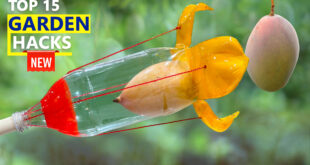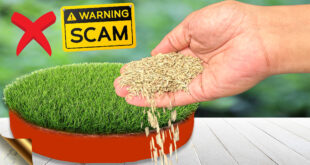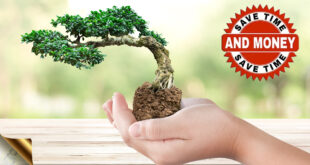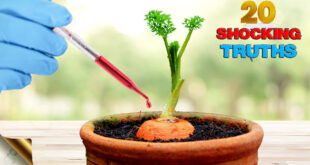In Today’s post, let us look into 15 household items and their miraculous uses for plants and garden.
15. Soap: Bar soap apart from cleaning purpose, there are some really powerful uses in gardening. You can scrape your nails into a bar soap before handling a potting mix and stuff like that. The dirt won’t enter your nail beds and this hack allows you to clean your hands easily after the job.
Liquid soap or even shampoo is used as a simple pesticide if you do not have any pesticide. Just add 10 to 20 drops or 1 or 2 teaspoons of liquid soap to 1 litre of water and spray on the affected plant. This will clear pests like mealybugs, whiteflies and aphids which are the most common pests in garden. Dish washing liquid soap is actually more potent than handwash liquid soap.
14. Chalk Sticks: Chalk is chemically Calcium Carbonate. You can take white chalk sticks and bury them into the soil while planting your veggies. That’s in initial stages. This really works wonders for plants like Tomatoes, Peppers, squashes, egg plants and almost any vegetable plant. You can bury two chalk sticks per container for these vegetable plants safely if you soil PH is around 6.0. For other plants to provide slow release calcium source, you can bury one chalk stick per container.
13. Turmeric: Turmeric powder has many effective uses in garden like: It repels ants when sprinkled around the plants. You can get rid of soil pests particularly fungal root rot and fungus gnats in the soil by mixing turmeric in soil. You can mix about 1 tablespoon per gallon of soil while making potting mix or 1 tablespoon of turmeric in 1 gallon of water or 1 teaspoon per liter of water and thoroughly water your affected plant with this solution. Its also helpful in healing tree wounds and in grafting as it prevents fungal rot. Another common use of turmeric is in rose die-back disease.
12. Vinegar: You can use vinegar to clean your rusty garden tools and pots. To make your soil more acidic for acid loving plants like hydrangeas, rose, hibiscus and so on and increase flowering in these plants. To do this, Mix one table spoon of white vinegar to one litre of water and water you acid loving plants with this solution once every 15 days to reduce the soil PH. Vinegar is also a strong pesticide. Its almost 100% effective in clearing powdery mildew fungus. To make this spray add One cup of White Vinegar to 1 litre of water and shake well and spray it on the affected leaves. It is also effective against white files and mealy bugs. It is also an animal repellent. Just soak some pieces of cloth and stuff them at entrances or behind pots to deter animals that can spoil your garden.
11. Baking Soda: Apart from cleaning your dirty garden tools and stuff with baking soda, you can also use it for other purpose like sprinkle to drive away Foul Smell from your Compost Pile or compost bin. To kill cabbage worms – Sprinkle Baking soda + flour like wheat flour in 1:1 ratio on the cabbage or broccoli leaves. The worms munch on this and die within 1 or 2 days. Baking soda also encourages flower blooming. Make a solution of 1 teaspoon baking soda in 1 litre of water and spray on your plants with flower buds or unopened flowers.
10. Asafoetida or Hing: The most effective use of asafetida is to treat leaf curl disease in plants. Add 5 gms of asafetida powder to one liter of sour butter milk. Mix well, leave for an hour, then sieve the solution and load your spray bottle. Spray over your affected plant. Repeat this every 3 days for 3 – 4 times. Leaf curl disease which is common in pepper and tomato plants will be completely cured by this treatment. Asafoetida can also be used to repel animals in your garden. Just hang some pieces of it in your garden entrances. Animals hate the pungent odor of asafetida. It also repels other insects and termites.
9. Charcoal: Hard wood charcoal has lots of amazing uses in garden like filling your pot bottom with charcoal pieces reduces pot weight. It can be used for mulching and garden décor. Mixing charcoal in soil can act as a good fungicide and prevent root rot, especially for expensive succulent plants. It also increases soil PH, when your soil is too acidic. It also works as a soil conditioner making the soil well draining. It also hold the fertilizers added for a longer duration and make them act like slow release fertilizers. Sprinkled charcoal powder helps deter many insects like the voracious beetles which can create havoc in your garden or on your crops.
8. Alum: Alum or Potash Alum can help to boost flowering. It makes the soil acidic for acid loving plants like hydrangeas, rose, hibiscus and so on. Just 5 gms alum powder per litre of water and water your plants once in a month. Alum is also a good pesticide in higher concentrations, like 100 grams per litre of water and spray on the plants to kill many pests including cabbage worms, cutworms, slugs and snails, etc. It is well known for mostquito control as a larvicide when sprinkled over the stagnant waters.
7. Banana Peels: Banana peel is one of the highest organic sources of potassium. It helps strengthen the plant and increases flowering and fruiting. You can make banana peel tea or banana peel fertilizer powder if you intend to store it. To make banana peel tea, soak pieces of banana peels in water for about 3 to 5 days. Use this banana tea in 1:5 dilution to water your plants once in a month. To make banana peel fertilizer powder, sun dry pieces of banana peels for 2 to 3 days till they are crispy enough to make a powder. Add one tablespoon of this powder once in a month and see the effect.
6. Aloevera: Aloevera has numerous benefits not only to the human body, but also to plants, like: It helps in faster rooting. Just insert a cutting into a piece of aloe vera and plant into soil. Rooting is faster and success rate is higher. Diluted aloe vera gel sprayed or watered to your seeds helps in faster and healthier germination. High levels of certain compounds found in aloe vera confer immunity or resistance against many plant diseases. Aloevera can also be used as a potent pesticide if mixed with other agents like neem oil, especially for pests resistant against certain pesticides.
5. Onions Peels: contain many useful substances like sulphur, quercetin, potassium, phosphorus, zinc, and so on. So, do not throw away the onion peels. The simplest use of these peels is to use them for mulching. If you have time you can make a fertilizer out of these onion peels. Just soak the peels in water for 1 to 2 days and water the solution to your plants once in a month to notice the benefits.
4. Tea and Coffee Waste: Do not throw this away. It can certainly boost flowering in your plants. It contains tannic acid which helps plants like Rose and hibiscus to increase flowering. You can wash the waste for any sugars and directly add to your plants or collect this and sun dry this powder and use it for your plants. You can also add this waste directly into your compost bin for making a rich compost.
3. Cinnamon: Cinnamon powder from your kitchen is well known for its wonderful uses in gardening. It can be used as a rooting agent to increase the chances for rooting cuttings. Just dip the cutting into cinnamon powder and plant it. It also deters ants when sprinkled around your plants. Its antifungal properties also fight fungal attacks to your seedlings. Just sprinkle fine cinnamon powder over your seedling and prevent dampening off.
2. Eggshells: Though eggshells are a great source of calcium, do not add crushed egg shells directly to your plants. It takes many years to decompose and release that calcium into the soil. You need to instantly release this calcium from eggshells by using Vinegar. Make eggshell powder first and then add a cup of vinegar to it. Stir it well and leave for an hour. The acetic acid breaks the eggshell compound and release free calcium into this solution. You can then dilute this solution to 1: 10 or 1:20 and then water your plants to treat or prevent acute calcium deficiency problems like tomato blossom end rot disease and other problems like bud or flower or fruit drop off and increase your flowering and fruiting. You can also add egg shells to compost bin for a calcium rich compost.
1. Aspirin: Aspirin is acetyl salicylic acid. Salicylic acid is a plant auxin and a rooting hormone which is proven to accelerate rooting and also it confers immunity against many plant diseases. You can use a dispersible 350 mg Aspirin tablet. Just a little of it will do the trick. A quarter or half a tablet is sufficient. You can read all detailed articles on these individual stuff by searching our website for that particular stuff.
 GKVKs – Gardening Tips and Store Gardening Tips and Store
GKVKs – Gardening Tips and Store Gardening Tips and Store




